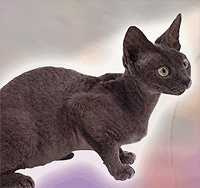Breed: Devon Rex
Temperament: mischievous, playful
Cost: $300+
Lifespan: 12 years
Recommended for: cat lover
Maintenance: medium
If you love cats and just want a pet which is a little different, the Devon Rex could be the cat for you! While not guaranteed to suit every cat-allergic person, they are proven successes with many.
Appearance
The Devon Rex has a sweet, elf-like face with big eyes and bat ears. Their most obvious difference to ordinary moggies is the sparse, crinkled fur which covers the body, and the crinkled facial whiskers. They come in a wide range of colours and weigh between 3.5-5.5kg (8-12lb).
Temperament
The Devon Rex is an outgoing, playful cat which is said to be good with children. Two cats may be better than one if they are to be left alone for long periods of time because a bored Devon Rex has been known to shred curtains.
Space & housing
Due to their rarity and outgoing nature, Devon Rexes are probably best kept indoors. They are said to be very adaptable cats, and if provided with a few toys, a scratching post and a climbing pole, they should be perfectly suited to flats or townhouses, as well as suburban homes. They shed minimal hair.
Health
They feel the cold so extra heat sources like heating pads may be useful in winter; Ears need to be wiped weekly to remove dust and skin oils; Both muscular dystrophy and haemophilia are known in cats overseas but appear to have been eliminated in Australian populations.
Breeding
There are usually 3-5 kittens per litter, with few birthing problems reported.
Maintenance
Devon Rexes require minimal grooming, but remember to wipe the ears weekly.
History
The Devon Rex is the result of a mutation, in this case a curly-coated feral tom in Devon in the 1960s. When this tom mated with a local farm cat one of the kittens was also curly coated. Selective breeding began to enhance the difference and the Devon Rex is accepted as a breed worldwide, although still uncommon. It is genetically separate to the other curly-coated cat, the Cornish Rex.
For further information
Bambi Edwards, phone: (02) 9523 3507 Colleen Walters, Secretary, Rex Cat Fanciers, Waratah State Cat Alliance (WSCA) phone: (02) 9523 2962 Rex Cat Club of Queensland, Sec: Liz Whitney, phone: (07) 3277 4381 Governing Council of the Cat Fancy of SA, Nell Evans, phone: (08) 8449 5880 Feline Control Council of Victoria, Marion Jones, phone: (03) 9281 7444



